Panhandlers, homeless camps are appearing in areas of Daytona Beach that may be surprising
DAYTONA BEACH — Drive near the entrance of the Walgreen's at Beville Road and Clyde Morris Boulevard, and you might see one of the two men who take turns sitting in a wheelchair and holding a tattered cardboard sign that says, "Homeless, anything helps."
Continue over to the adjacent shops or Publix, and if you get out of your vehicle, you might not make it from your car to the grocery store or sandwich shop without getting hit up for cash.
It's an unheard-of scene for the shopping complex on the city's west side that's been virtually trouble-free for its decades-long existence, but the vagrants have become part of that area's landscape over the past six months.
The cause is likely linked to several homeless camps that took root behind the Publix plaza, and a judge's August order that's been blocking enforcement of Daytona Beach's panhandling ordinance.
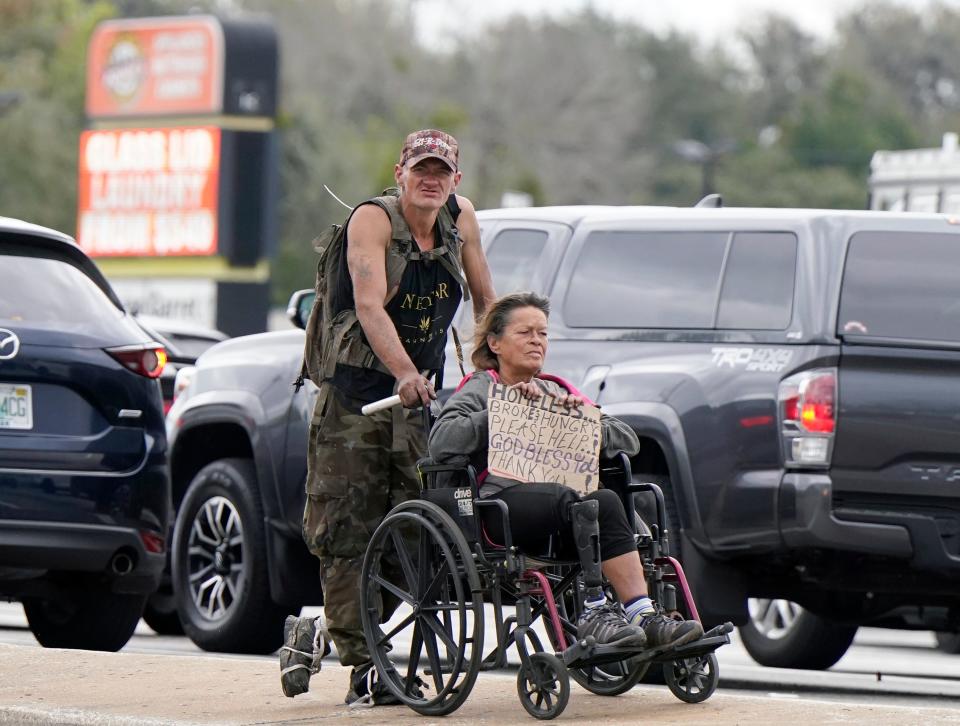
Complaints the past few weeks from fed-up residents who live and shop in the area got the city's attention, and now city leaders are working with the property owners to get three recently discovered homeless camps dismantled.
Tackling the more complicated problems of panhandling and homelessness will take much more time, as a lawsuit challenging Daytona Beach's panhandling law works its way through the courts, and state lawmakers debate legislation that seeks to prohibit camping and sleeping on public property without a permit.
Daytona Beach, which has had a 100-bed homeless shelter for adults for four years, already has a local law that bans unauthorized camping.
Is panhandling in Daytona Beach legal again?
In 2017 and 2018, it was almost impossible to drive through a major Daytona Beach intersection, stroll the riverfront, or walk along the Boardwalk without crossing paths with a panhandler. When the city passed tough new rules regulating panhandling in early 2019, the beggars evaporated.
The panhandling regulations adopted in February 2019 allowed police to charge $200 fines and arrest people who solicited in outlawed areas, begged for money after the sun went down, or tried to cajole people in ways deemed to be overaggressive.
In the years that followed, the occasional panhandler would pop up, but it wasn't until the 2022 lawsuit against the city was filed that the beggars started to mushroom again.
The federal lawsuit argues that Daytona's panhandling rules violate First Amendment rights to freedom of expression.
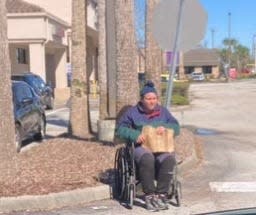
In August, a U.S. District judge issued a preliminary injunction that is blocking enforcement of Daytona Beach's panhandling ordinance. The lawsuit brought by the Southern Legal Counsel and pro bono attorneys Sabarish Neelakanta and Paul George seeks to make the injunction permanent.
The city has appealed the ruling on the preliminary injunction.
The suit, filed in the Orlando Division of the U.S. District Court for the Middle District of Florida, also seeks a declaration that the challenged provisions are unconstitutional and damages on behalf of four plaintiffs who argue charitable donations helped them survive.
The legal challenge will probably be working its way through the courts for at least the next few years, said Melbourne attorney Michael Kahn, who helped Daytona Beach draft its panhandling ordinance and is representing the city in the lawsuit.
Kahn said he expects more rulings on the case in the next 30 days, and he anticipates that whoever is on the losing side will appeal. He said the case could be appealed all the way to the U.S. Supreme Court.
"It's a case of national significance," he said.
Homeless people, panhandling at Beville Publix?
There has been panhandling and other crime on the eastern end of Beville Road near the Wal-Mart for years, but until last fall those problems hadn't crept toward the western end of the road beyond Clyde Morris Boulevard.
City Commissioner Stacy Cantu, who represents the western side of Daytona Beach, started getting peppered with panhandling complaints a few weeks ago, so she let top staff at City Hall know. Then she did her own investigating.
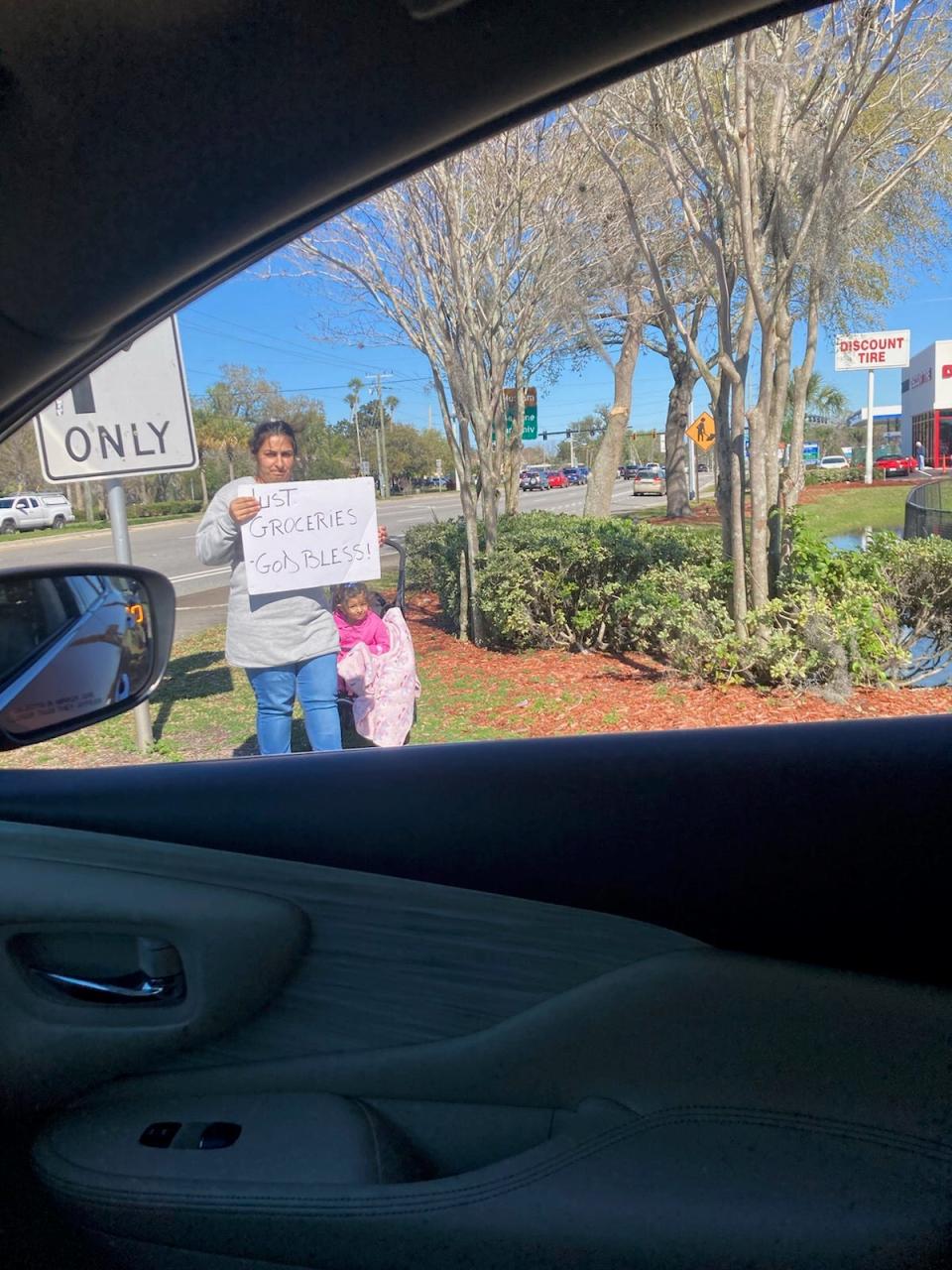
One day last week, she drove to Beville and Clyde Morris and saw people panhandling on every corner of the intersection. She traveled farther east on Beville and saw more panhandlers.
At Nova Road and Beville, she saw a woman with a small girl holding a sign asking for groceries.
She also spotted the men taking turns sitting in a wheelchair outside the Walgreens at Beville and Clyde Morris. She said she's seen both of them get out of the chair and walk.
Cantu said when she and others have tried to steer some of the panhandlers to agencies that can help them, they dart away.
They seem to just want money, Cantu said, and some don't take no politely.
"Some are aggressive. They'll follow you to your car," she said. "One lady said a guy yelled at her."
The stores can trespass people off of their property if they connect with a police department program, something Publix is already doing.
'What are we supposed to do?'
After Cantu checked out the panhandlers, she drove to the nearby areas where she was told she would find homeless camps.
The three camps are located off of Hancock Boulevard and Woodcrest Drive behind the Publix plaza. One is on the private property of the Oasis Apartments, and the other two are on county government property.
"You can see their trails and their tents," Cantu said. "I saw a guy carry a pizza into one of the camps."
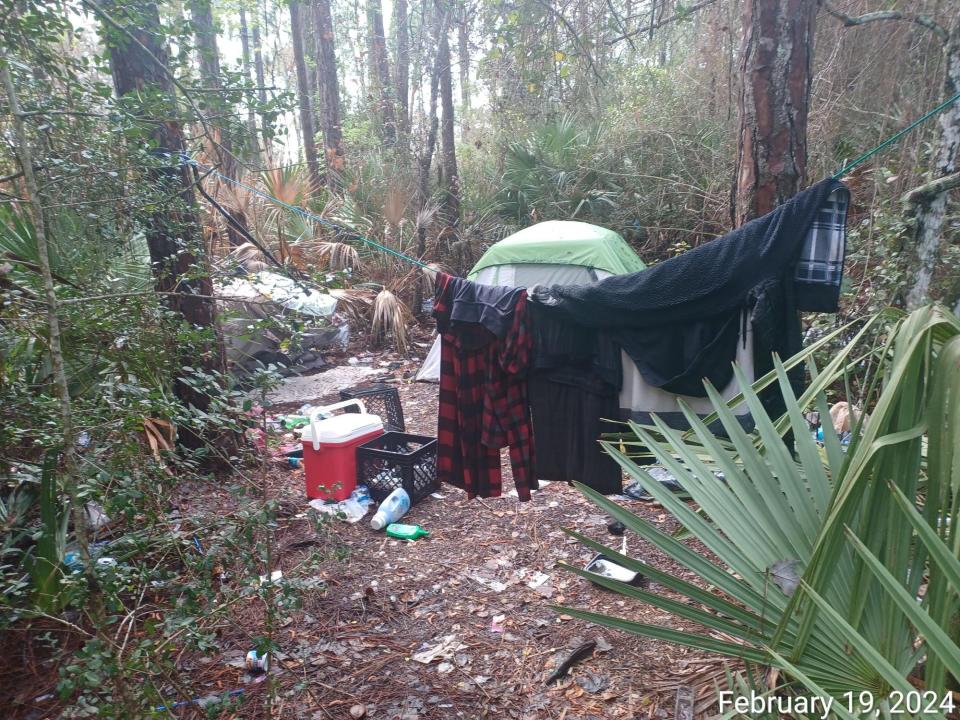
She suspects there could be as many as seven homeless camps behind the Publix-anchored plaza, and she hopes the city and county can get them cleared out of the area.
She said she and others are trying to connect the homeless to the city's services, not harass them.
"I hope the people living there who want help get help, and the rest leave," Cantu said. "I have a lot of residents complaining about the homeless, saying they're chasing them to their cars and yelling at them if they don't give them money. ... What are we supposed to do, just let them live there and do this?"
She said there's been one homeless couple in the area around Beville and Clyde Morris for about five years "who will be nasty to you if you try to help them." But until very recently, that area was not known to have homeless people, she said.
'It's like giving an addict drugs'
Pelican Bay neighborhood resident Hal Lloyd has been approached by panhandlers in the Publix parking lot multiple times.
"I've had them come up to me when I get out of my car," said Lloyd, a retiree who sits on the city's Economic Development Advisory Board. "I go to the Publix service desk and say I'm being accosted by these people, and they're usually very good about it."
Lloyd said he was "disheartened" when Daytona Beach stopped enforcing its panhandling ordinance.
"I find it so embarrassing when I have guests and I take them into town, and people are begging," he said.
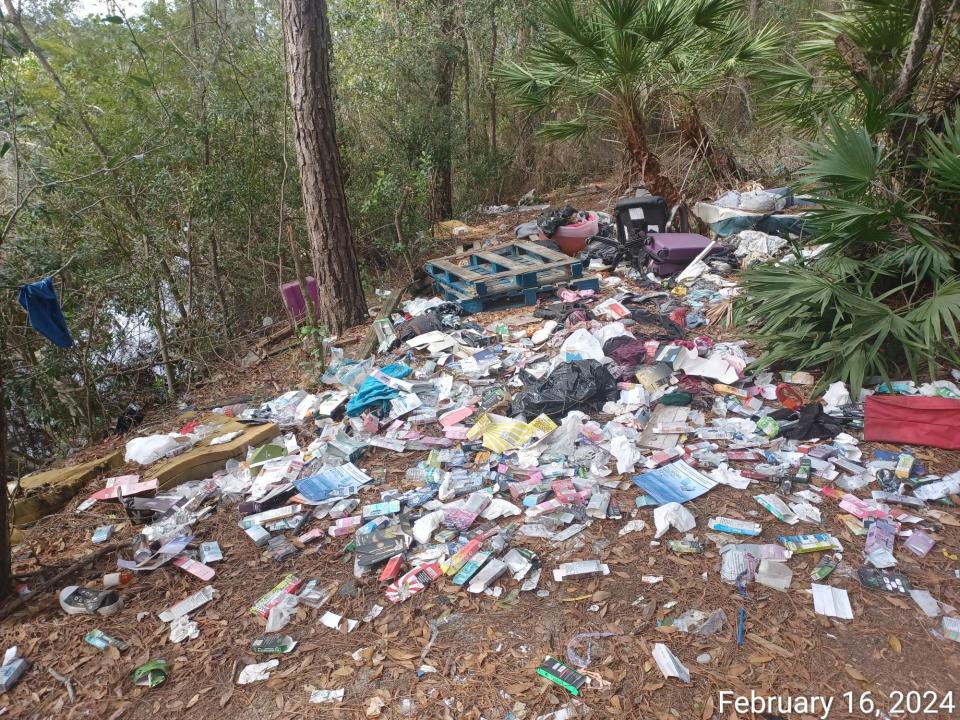
He said he never gives panhandlers money because he feels "it's like giving an addict drugs. It's counterproductive."
He once watched a well-meaning person give a downtrodden-looking panhandler a bag of apples, and the panhandler angrily threw the apples on the ground.
"The panhandler wanted money. If people would stop giving them money, they would go away," Lloyd said.
He said he's been annoyed by the begging, but he's never felt endangered. Several times he's said no before the panhandler asks for anything, and they just turn around and walk away. But he still would like Daytona Beach to be able to enforce its panhandling ordinance.
'Our customers and tenants come first'
Sam Jaffe, owner of the Beville Road Publix property, said maintenance people on site do a good job of spotting problems, quickly dealing with them and removing people when needed. Police have also been helpful, he said.
Jaffe said he's sensitive to the homelessness problem that's growing nationwide, but added that "our customers and tenants come first and foremost."
City Communications Manager Susan Cerbone said Denzil Sykes, the city's code enforcement manager, has been looking into the homeless camps near Beville and Clyde Morris.
"Code has been in contact with management at Oasis (Apartments), and they are working to clear out the camp and will post no trespassing signs," Cerbone said. "According to Denzil, they've been very receptive."
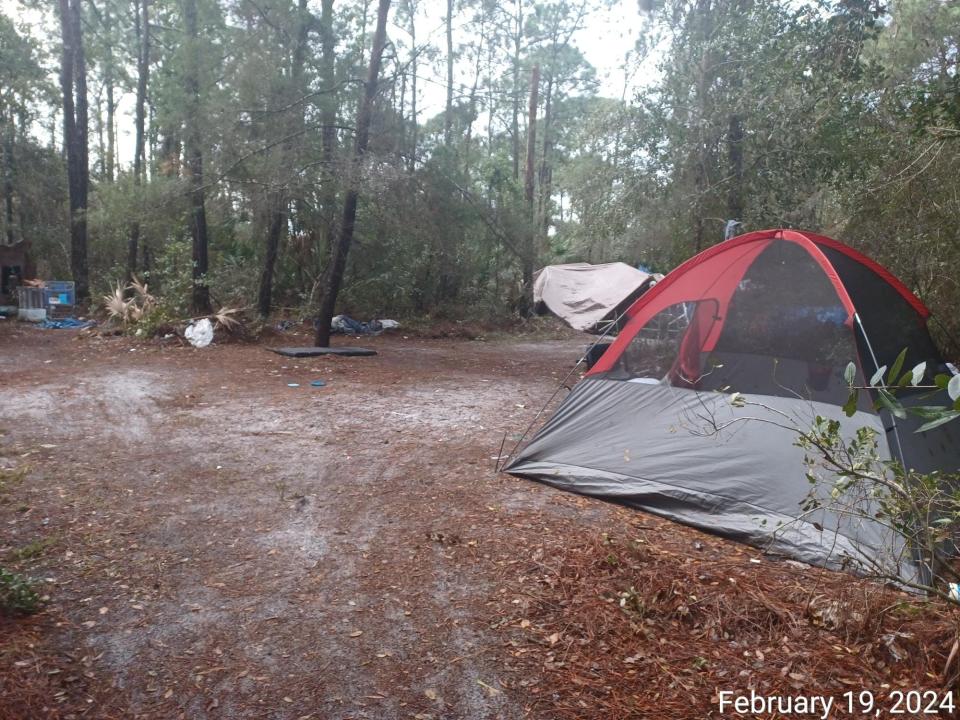
The other two camps, which are on county property, are near the school bus facility. The county's code enforcement unit has been notified, she said.
"They are expected to clear out the debris and have been asked to trim the vegetation," Cerbone said.
Mark Bostwick, the city's vacant lot inspector, sent an email about the homeless camps on county property last week to Sykes.
"I would recommend that the county clear out all the underbrush on their property on Beville Road heading west," Bostwick wrote. "Homeless population are using the density of the underbrush to set up camps throughout the city. This would help law enforcement to be able to see possible hiding places for transients."
More about Daytona Beach panhandling: New Daytona law scares off panhandlers
Two days later, Sykes sent an email about the camps to county Director of Growth and Resource Management Clay Ervin and County Councilman Matt Reinhart.
"We found this camp embedded deep into your property," Sykes wrote. "I am fine meeting you or someone on-site to show where it's located. We found another camp across the street (the property belongs to Oasis Apartments). After receiving complaints from shoppers and business owners in the adjacent plaza, Code has stepped up efforts to address homeless camps in the area."
You can reach Eileen at Eileen.Zaffiro@news-jrnl.com
This article originally appeared on The Daytona Beach News-Journal: Daytona Beach homeless camps could be linked to spike in panhandling

